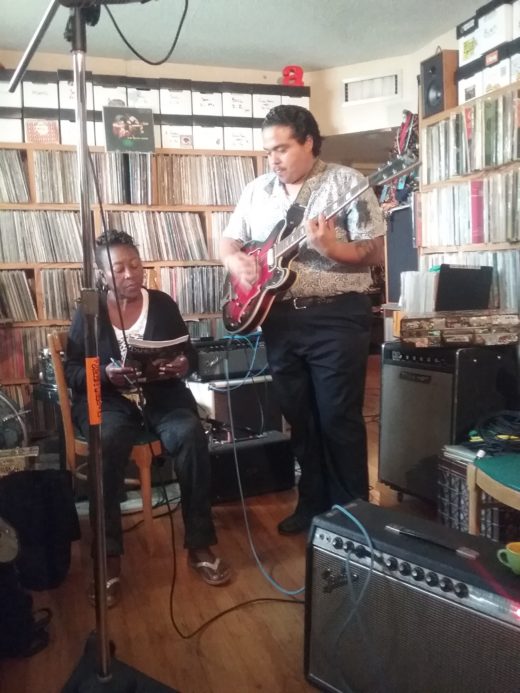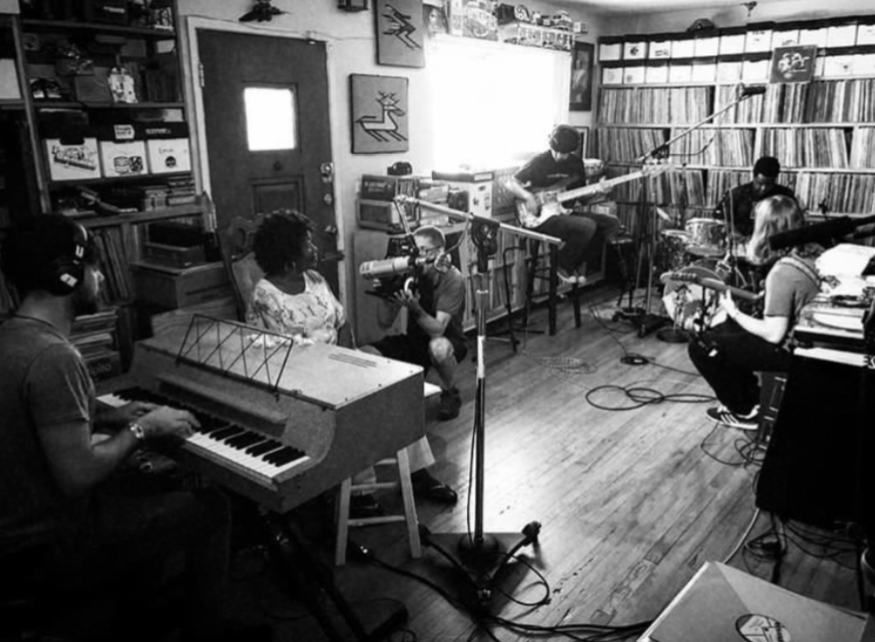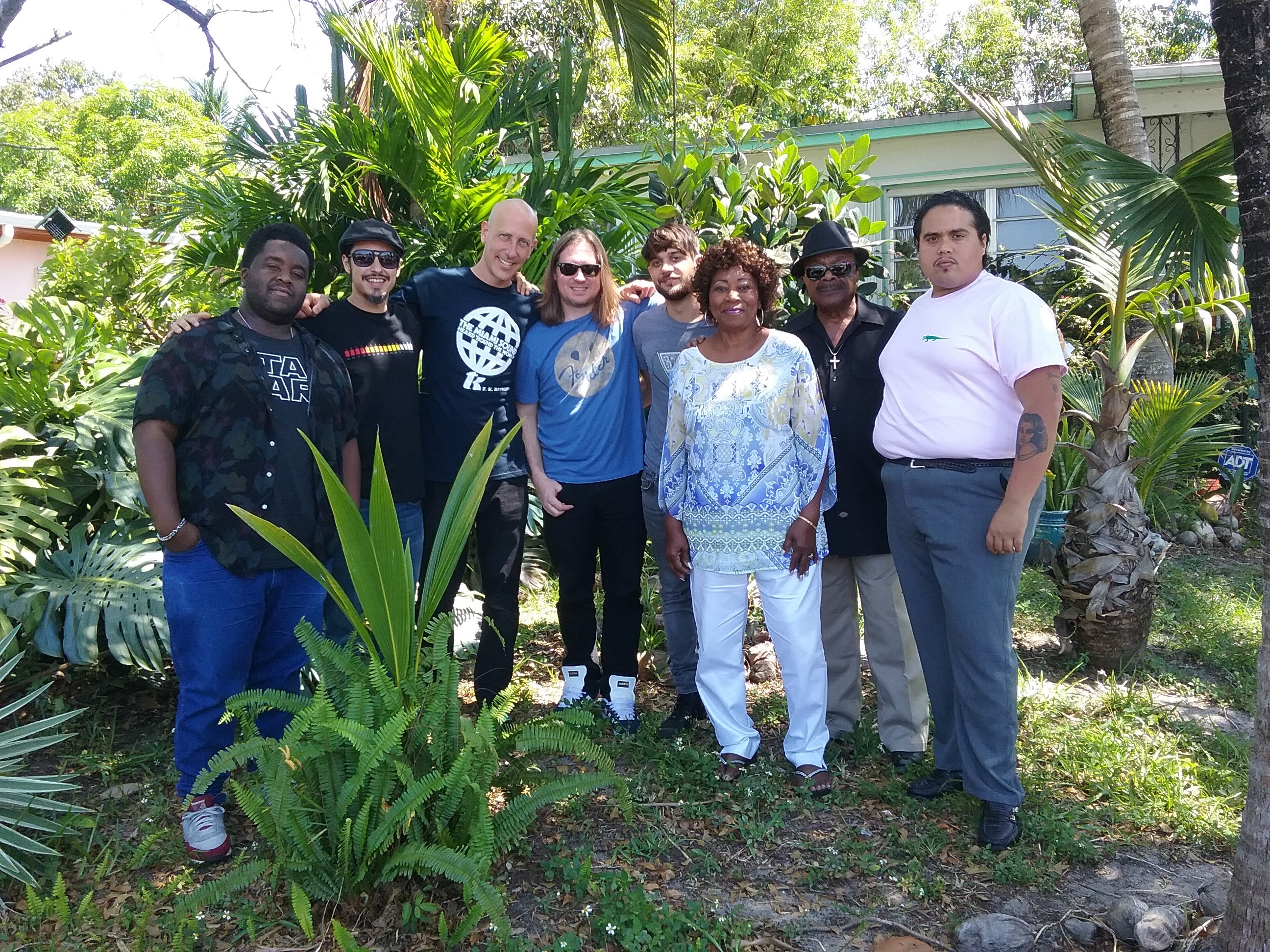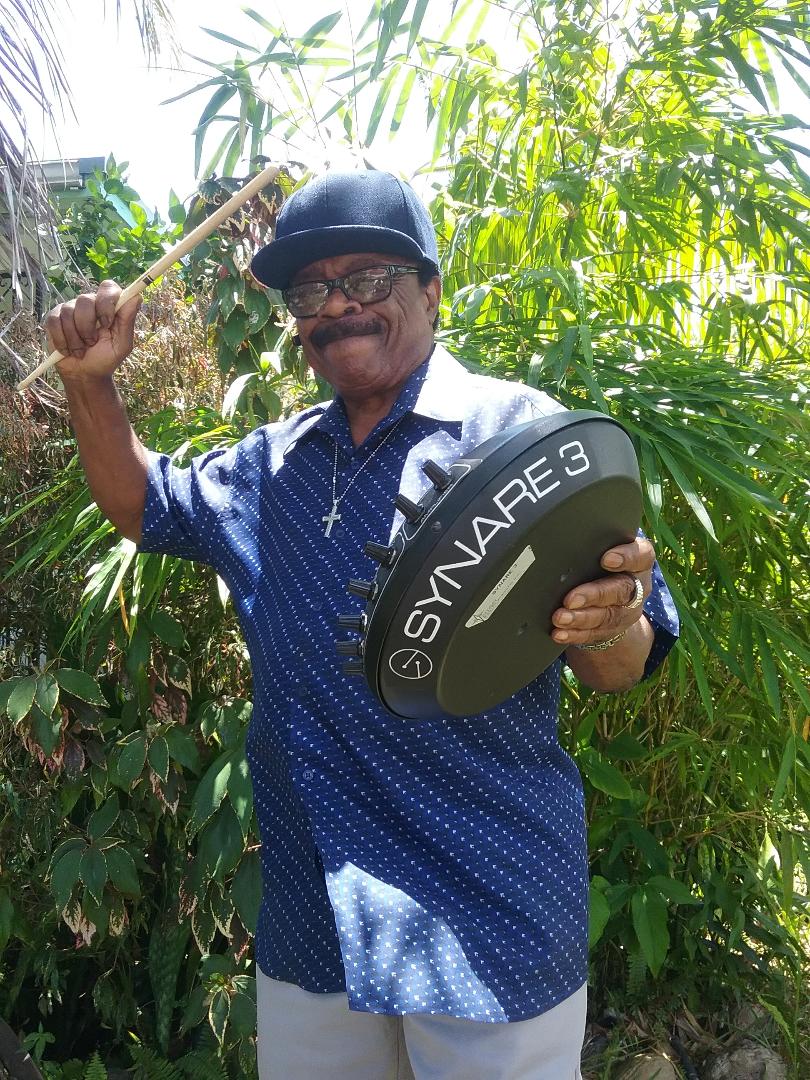The Return of Deep City
Andrew Yeomanson
 Helene Smith and Eric Escantes on recording day.
Helene Smith and Eric Escantes on recording day.
In 1997 a friend played me a 45 of You Got to Be a Man by Helene Smith and informed me that this record was from Miami’s long forgotten soul heyday. Heavy bass and drums tore their way through the speakers, horns blaring in answer to Helene’s preachy vocal. I soon found myself digging through dusty piles of 45s from Florida City to Jacksonville in search of more missing pieces of the puzzle, relying on bits of information gleaned from older collectors and fueled by the powerful sounds pressed into the grooves of these circular artifacts. This music was the exclusive domain of record collectors, DJ’s and soul music enthusiasts until the release of several compilations which cast a light on Miami’s funky past. The Miami Sound from UK label Soul Jazz was the first and included Helene Smith’s You Got to Be a Man, but it was Eccentric Soul: The Deep City Label from the Numero Group which blew the lid off of the scene and put this underexposed music back onto (NPR) radio and into the public consciousness again.
Deep City was a short-lived record label owned by two Florida A&M University alumni: Willie Clarke and Johnny Pearsall. Inspired by Motown Records and propelled by the momentum of their college marching band days and Caribbean rhythmic influence they sought to make their mark on America’s burgeoning soul music scene with the label’s signature “Miami Sound.” Drawing from South Florida’s rich pool of talent, they began working with songwriter Clarence Reid, writer/arranger Arnold Albury and backing groups such as The Moovers and Frank Williams Rocketeers featuring Willie “Little Beaver” Hale. Helene Smith was the first artist they would record, and the only one to record a full-length LP on Deep City Records. Smith went on to marry Johnny Pearsall and the whole story is chronicled in the documentary Deep City: The Birth of the Miami Sound produced by Marlon Johnson, Dennis Scholl and Chad Tingle. Willie Clarke went on to become a successful producer of soul, funk, and disco music for Henry Stone’s TK group of labels, taking the sound of Miami’s streets to the world. Helene Smith retreated from the music business, and by the mid 70’s had settled into life as a schoolteacher, housewife and mother.
Soon after the release of the Deep City documentary in 2014 there were rumors that Helene was considering coming out of retirement to record something new.I began receiving weekly phone calls from Willie Clarke, usually signing off with a threat to take me to the Olive Garden in Hialeah. For a while Willie was stuck on the idea of recording cover songs with Helene, and at one point talked of re-recording some of her Deep City material. I was more interested in seeing what would come from a session with young Miami musicians, keeping with the gritty feel of the old recordings. All this amounted to a lot of talk without someone willing to cover the cost of the session musicians. Fortunately Marlon Johnson and Chad Tingle are filming a follow up on Helene’s activities and were willing to cover the personnel costs. With that hurdle out of the way, we still needed to decide on a song.
 The band on recording day. From left to right: Jason Matthews, Helene Smith, Rodrigo Zambrano, Dave Chiverton, Eric Escanes.
The band on recording day. From left to right: Jason Matthews, Helene Smith, Rodrigo Zambrano, Dave Chiverton, Eric Escanes.
Jason Joshua “Jay” Hernandez is part of a generation of musicians who gravitate to the music and style of the 1960’s and 70’s, yet somehow manage to carve a pathway through the digital jungle of today. Jason and I have been recording his various projects: “Ketchy Shuby”, “The Collosians”, “The Beholders” and others at City of Progress for the past several years. Jason always seems to have a song knocking around in his head. Willie and I both thought it might be a good idea to get Helene and Jason together, so we set up a meeting. When the day comes, Willie and Helene arrive before Jay, and Helene seems shy and reserved. Willie and I go into the control room to listen to some of Jay’s songs, and Helene pops in and says “I like that!”. Jay finally arrives and introductions are made. He and Helene seem to hit it off immediately and in seemingly no time at all are working out a song together. The tune is a groovy mid-tempo number held together by a hooky bass and guitar line. Jay and Helene rework some of lyrics to reflect Helene’s experiences a bit more. We record a quick demo version with a drum machine for Helene to practice with.
 The band on recording day. From left to right: Jason Matthews, Helene Smith, Rodrigo Zambrano, Dave Chiverton, Eric Escanes.
The band on recording day. From left to right: Jason Matthews, Helene Smith, Rodrigo Zambrano, Dave Chiverton, Eric Escanes.

Now that we have settled on a song, we need to book the musicians for the session. I like the idea of using an existing band because there is a certain chemistry within bands which is hard to replicate, and adds so much to the feel of a recording. For this reason I want to use Electric Kif, also clients of my studio. I know they will make a great rhythm section, however Jay is not convinced and would be happier if I used his band. In the end, the musicians for the sessions are three of the four members of Electric Kif: Jason Matthews on electric piano, Rodrigo Zambrano on bass, Eric Escanes on guitar, plus Dave Chiverton, one of the finest jazz and gospel drummers in South Florida today.
On the morning of the session, Marlon, Chad and the lm crew are the first to arrive. I have spent the previous day setting up all the instruments and mics. Willie and Jay both arrive in their ten year old Cadillacs, dressed sharp. Band is here. Everyone is on time. Jason Matthews plays a 1959 Wurlitzer electric piano, Eric plays a 64 Fender Jaguar through a 68 Deluxe Reverb amp, Rodrigo is on a 74 Jazz bass and Dave C is playing my 64 Ludwig drum set. At the heart of my studio is a Trident 80B analog recording console and MCI JH24 2” 24 track tape machine. We are in tone heaven.Helene sits next to the electric piano and presides over the whole scene. Jay starts to run through the song with Helene and the band, Willie interjects with his ideas as well. Marlon and Chad film the process as we start recording takes of the song to tape. Dave Chiverton’s kinetic drumming percolates around Jason Matthew’s metronomic eighth note pattern on the Wurlitzer, and steady riffing of the bass and guitar. After four or ve recorded takes we have enough to choose from. Jay seems to like the energy of one of the early takes, so we set up the microphone for Helene to lay down her vocal. It has been forty years since her last recording, and six hours in the studio. We are all nervously wondering if she will be able to deliver. Willie and Jay are on the other side of the glass to coach her. They have scarcely finished writing the lyrics to the song. As soon as Helene starts to sing I’m amazed to hear the same voice I’ve been listening to for so long, deep and soulful but with a girlish innocence. Wow. There it is, still there! We do 3 or 4 takes with Helene, reworking the phrasing here and there, Jay and Willie singing to her from inside the control room.
Manufacturing records is a complicated process with many steps: electronic, mechanical and chemical, all resulting in a little round piece of at vinyl. In addition to all the technical rigamarole, pressed into the grooves are other things: hopes, dreams, and a whole range of other emotions. Going to the lengths it takes to produce a vinyl record requires a strong belief in the work you are creating, a willingness to back that up with your hard earned cash and the idea that someone out there will want to buy your product. Once you have your records then the real task begins, and this is when optimism is tested and disappointment lurks around every corner. Willie’s dogged determination was enough to carry him over the top and he scored many hits as the 60’s slid into the 70’s. He remains an optimist, and a born hustler. Jay plans to release the song as a 45 on his label, Mango Hill Records, distributing them everywhere from Finland to Japan, giving Helene another shot at a music career she left behind many years ago. For me as a record collector and recording engineer I never could have imagined that both my passions would intersect in such a perfect way.
Andrew Yeomanson has been living and making music in Miami since 1990. His activities include his band Spam Allstars and studio, City of Progress. He has been collecting Miami recordings for 20 years.










